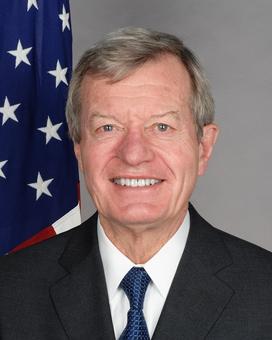Baucus Says Erratic Behavior Could Harm U.S. Relationship with China
The future of America’s relationship with China depends on predictability and respect, said Max Baucus, the former ambassador to China under President Barack Obama, on campus April 9. Baucus spoke to about 100 students participating in a conference held by the Princeton University U.S. China Coalition (PUCC).
“China is a very conservative country,” Baucus said. “It’s very strategic and doesn’t want the boat rocked too much.”

Baucus says President Donald Trump’s administration, which has broken several Obama-era foreign policy traditions, may be putting China on edge.
“We can’t be erratic,” he said. “The Chinese respect predictability.”
Baucus referenced Trump’s phone call with Taiwan’s president as an early misstep. “I think President Trump made a mistake talking to Tsai Ing-wen,” Baucus said. “It was a mistake that questioned the One China policy. It was something he didn’t need to do, and it caused more problems than it solved.”
Baucus, who served six terms as a senator from Montana before becoming ambassador, says Trump faces a plethora of challenges that require China’s support. Regarding North Korea’s nuclear proliferation, for example, Baucus believes teamwork is essential. “Any North Korea solution has to include China,” he said. “This idea of putting nukes in South Korea is preposterous. I thought we were supposed to reduce nuclear weapons in the world, not increase them.”
In terms of bettering U.S.-China relations, Baucus says more effort must be made to foster personal, rather than solely political connections. “We need to get to know each other better, because there’s going to be a crisis — whether it’s North Korea, I don’t know what it’s going to be — that we can’t anticipate,” he said.
Baucus believes more Americans need to be open to learning about Chinese culture in order to help facilitate a better relationship between the two countries.
“Chinese people and American people are basically alike,” he said. “We all want decent income, food on the table, decent healthcare, clean air and water.”











No responses yet